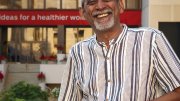As a young man in India, Vikram Patel wanted to be a chef. “I remember very clearly getting into catering school,” says the new chair of the department of global health and social medicine. But a bent for biology, uncovered by an exam, made a career in medicine almost inevitable. A 1987 Rhodes scholarship propelled Patel to Oxford, and on to a doctorate in public health from King’s College. His interest in the brain led him to study neurology, then psychiatry. Neither offered cures for patients, but the latter at least “gave people hope.” When he left England for Zimbabwe at the outset of a career in global health, Patel carried a single suitcase and a single book, now dog-eared: Harvard medical anthropologist Arthur Kleinman’s Patients and Healers in the Context of Culture. Kleinman inspired Patel. Back in the familiar cultural context of India after his stint in Africa, he founded Sangath, a research organization that works with government health systems to support physical and mental health across people’s entire lives, focusing on children, adolescents, and their families. When Harvard offered a professorship in 2007, he reluctantly turned it down. “I was in the midst of one of my most exciting clinical trials,” he explains, testing a psychological treatment for depression that has since transformed the field. Patel now holds a professorship named for the late Paul Farmer, who in 2017 assured him that if he came to Harvard, he would not have to give up his life’s work helping people. Instead, using new technologies, his research has circled back to neurology and the study of child brain development. Nor has he given up his “lifelong joy of working in the kitchen. Chopping an onion may not sound like the most fun thing to do. But I find it very calming.”
Vikram Patel
Vikram Patel
He wanted to be a chef, but instead became a leader in global health

You might also like
What Bonobos Teach Us About Female Power and Cooperation
A Harvard scientist expands our understanding of our closest living relatives.
Eating for the Holidays, the Planet, and Your Heart
“Sustainable eating,” and healthy recipes you can prepare for the holidays.
Five Questions with Michèle Duguay
A Harvard scholar of music theory on how streaming services have changed the experience of music
Most popular
Explore More From Current Issue

Inside Harvard’s Most Egalitarian School
The Extension School is open to everyone. Expect to work—hard.

How Stories Help Us Cope with Climate Change
The growing genre of climate fiction offers a way to process reality—and our anxieties.






